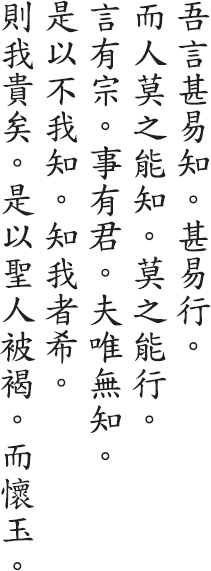70
 |
My words are easy to understand and easy to practice but no one understands them or puts them into practice words have an ancestor deeds have a master the reason I’m not understood it’s me who isn’t understood but because so few understand me thus am I esteemed sages therefore wear coarse cloth and keep their jade concealed |
TS’AO TAO-CH’UNG says, “Nothing is simpler or easier than the Tao. But because it’s so simple, it can’t be explained by reasoning. Hence, no one can understand it. And because it’s so near, it can’t be reached by stages. Hence, no one can put it into practice.”
WANG P’ANG says, “Because sages teach us to be in harmony with the course of our lives, their words are simple, and their deeds are ordinary. Those who look within themselves understand. Those who follow their own nature do what is right. Difficulties arise when we turn away from the trunk and look among the branches.”
LI HSI-CHAI says, “The Tao is easy to understand and easy to put into practice. It is also hard to understand and hard to put into practice. It is easy because there is no Tao to discuss, no knowledge to learn, no effort to make, no deeds to perform. And it is hard because the Tao cannot be discussed, because all words are wrong, because it cannot be learned, and because the mind only leads us astray. Effortless stillness is not necessarily right, and actionless activity is not necessarily wrong. This is why it is hard.”
SU CH’E says, “Words can trap the Tao, and deeds can reveal its signs. But if the Tao could be found in words, we would have only to listen to words. And if it could be seen in deeds, we would only have to examine deeds. But it cannot be found in words or seen in deeds. Only if we put aside words and look for their ancestor and put aside deeds and look for their master, can we find it.”
WU CH’ENG says, “The ancestor unites the clan. The master governs the state. Softness and humility are the ancestor of all words and the master of all deeds.”
YEN TSUN says, “Wild geese fly for days but don’t know what exists beyond the sky. Officials and scholars work for years, but none of them knows the extent of the Way. It’s beyond the ken and beyond the reach of narrow-minded, one-sided people.”
LU HUI-CH’ING says, “The reason the Tao is esteemed by the world is because it cannot be known or perceived. If it could be known or perceived, why should it be esteemed? Hence, Lao-tzu is esteemed because so few understand him. Thus, sages wear an embarrassed, foolish expression and seldom show anyone their great and noble virtue.”
HO-SHANG KUNG says, “The reason people don’t understand me is because my virtue is dark and not visible from the outside.”
CONFUCIUS says, “I study what is below and understand what is above. Who knows me? Only Heaven” (Lunyu: 14.37).
WANG PI says, “To wear coarse cloth is to become one with what is ordinary. To keep one’s jade concealed is to treasure the truth. Sages are difficult to know because they do not differ from ordinary people and because they do not reveal their treasure of jade.”
Words and deeds can be falsified, but not understanding and practice. In my translation, I have inverted lines seven and eight. In line ten, the word tse (thus) can also mean “follow,” and some commentators read the line: “Who follows me is esteemed.” As with geodes, jade is found inside ordinary looking rocks. Officials once wore it on their hats as an emblem of their status, and alchemists often included it in their elixirs. This verse is not present in the Kuotien texts.